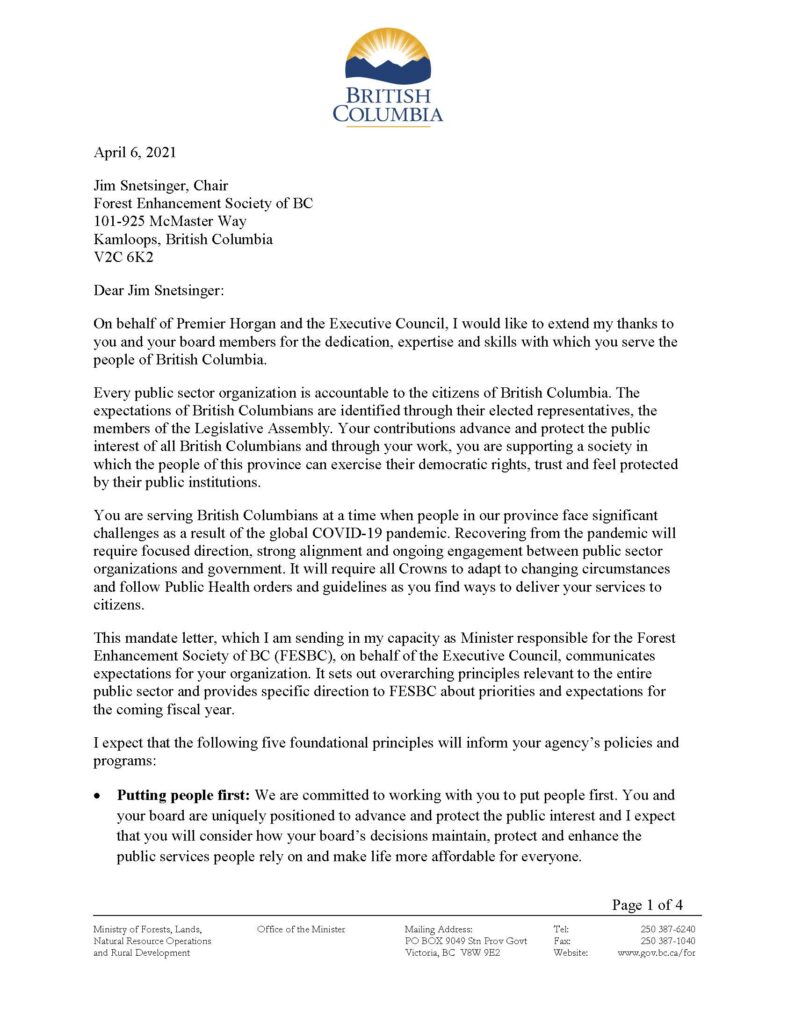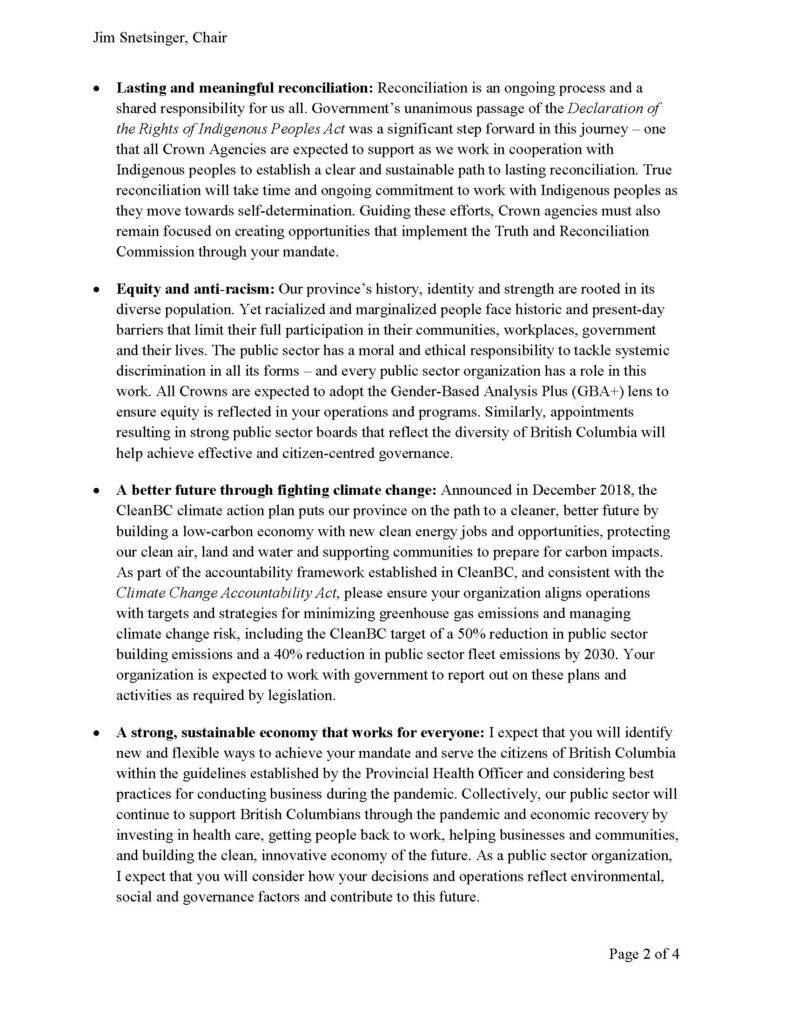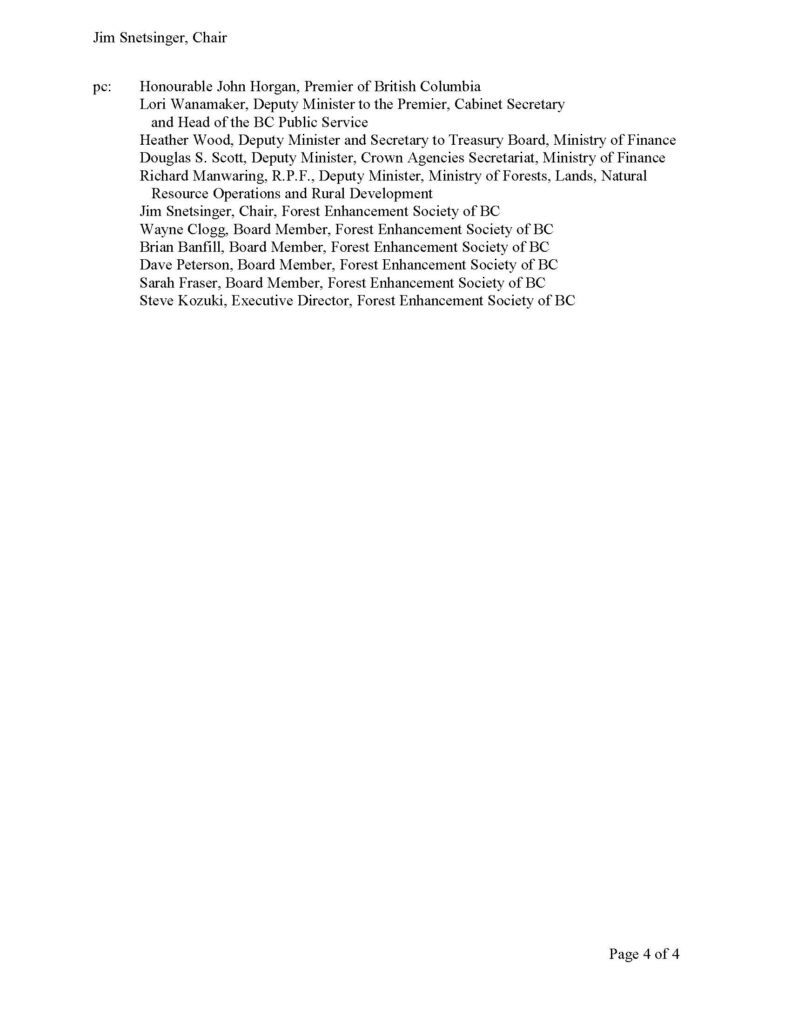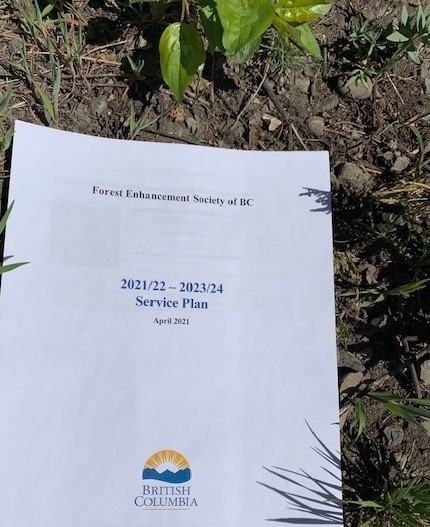FESBC Mandate Letter




Click the link above to view the Forest Enhancement Society of BC 2021/22 – 2023/24 Annual Service Plan.

VICTORIA – The Forest Enhancement Society of BC (FESBC) has allocated $3 million in new grants throughout the province to support jobs in the forestry sector and increase the use of wood fibre that otherwise would be burned as slash.
“This new funding is part of the government’s $1.5 billion economic recovery plan, which reflects our ongoing commitment to help British Columbians deal with challenges posed by the COVID-19 pandemic,” said Katrine Conroy, Minister of Forests, Lands, Natural Resource Operations and Rural Development.
“The grants will support local jobs and help make better use of wood debris left behind after timber harvesting.”
Katrine Conroy, Minister of Forests, Lands, Natural Resource Operations and Rural Development
The latest round of funding supports 15 different projects in different regions of the province, with individual grant amounts ranging from $6,000 to $663,748 (see backgrounder for details about each project). The projects will allow about 250,000 cubic metres of post-harvest waste wood to be used in the production of pulp, wood pellets, electricity and compost for soil remediation. This work will also provide environmental, economic and social benefits to B.C. communities, including a reduction in greenhouse gases.
“One of the aims of our StrongerBC economic recovery plan is to build stronger, more resilient communities in every corner of the province,” said Ravi Kahlon, Minister of Jobs, Economic Recovery and Innovation. “This program does just that, while also advancing the forest sector’s transition to high-value production, which is essential for B.C.’s long-term economic wellbeing.”
Eight of the approved applications were from new proponents that will receive FESBC project funding for the first time.
“We were very pleased to receive this additional funding to support incremental fibre use and forest rehabilitation projects,” said Jim Snetsinger, board chair, FESBC. “Upon receiving word of the $3 million allocation, our team moved quickly to prepare and announce its seventh intake for funding applications.”
“We were delighted with the quality and innovation shown in the proposals that we received. This work will help support families and communities in a time of need. It demonstrates the significant role that the forestry sector plays in our province’s broader economic recovery, while at the same time helping to achieve B.C.’s and Canada’s climate change targets.”
Contacts:
Aleece Laird
Communications Liaison
Forest Enhancement Society of BC
communications@fesbc.ca
250 574-0221
Ministry of Forests, Lands, Natural Resource Operations and Rural Development
Media Relations
250 213-8172
Connect with the Province of B.C. at: http://news.gov.bc.ca/connect
The Forest Enhancement Society of BC (FESBC) is a Crown agency. It was established in 2016 to advance the environmental and resource stewardship of the province’s forests by:
As of Jan. 28, 2021, the B.C. government has invested $238 million in FESBC, with about $237 million allocated to 270 projects since the society’s inception. Funded projects have helped minimize wildfire risks, enhance wildlife habitat, improve low-value and damaged forests, replant damaged forests and use fibre for green-energy production.
FESBC is a partner in the Forest Carbon Initiative, which is funded in part through the federal government’s Low Carbon Economy Leadership Fund. This initiative assists with B.C. government priorities, such as:
The Forest Enhancement Society of BC has allocated another $3 million in grants to support 15 projects that will increase the use of wood fibre that otherwise would have been burned as slash.
Funding for these projects has been distributed as follows:
See the FESBC Projects page for a map of all projects: https://www.fesbc.ca/projects/
KAMLOOPS, B.C.: The Forest Enhancement Society of BC (FESBC) is pleased to announce the appointment of Sarah Fraser to the Board of Directors.
Sarah is currently the A/Assistant Deputy Minister, Rural Opportunities, Tenures and Engineering Ministry of Forests, Lands, Natural Resource Operations and Rural Development. She is responsible for a diverse portfolio including strategic and operational policies that relate to authorizing disposition of Crown land and forest tenures, sale of high value Crown land, and remediation of Crown contaminated sites.
The FESBC Board is responsible for the strategic direction and performance of the Society, and reviews and approves annual operating plans and budgets, including the proposed forest enhancement projects.
“Sarah’s extensive background and experience in economic development and community transition support programs will be a benefit to the important strategic decisions we make as Board members for the benefit of British Columbians. Her background in public service working to further rural policy and programs will certainly strengthen our organization and our FESBC Board and staff are pleased to welcome Sarah to the team.”
-Jim Snetsinger, RFP, FESBC Board Chair
Fraser is equally enthused to join the Board:
“I am excited to join FESBC to further the important work of the Society,” said Fraser. “FESBC has been a leader and an agent of action, funding projects which help fight climate change, reduce wildfire risk, and build future timber supply. The innovative work is done in consideration of social, environmental, and economic benefits for Indigenous peoples and communities and am pleased to lend my knowledge and experience.”
-Sarah Fraser
Aleece Laird, Communications Liaison | communications@fesbc.ca | 250.574.0221